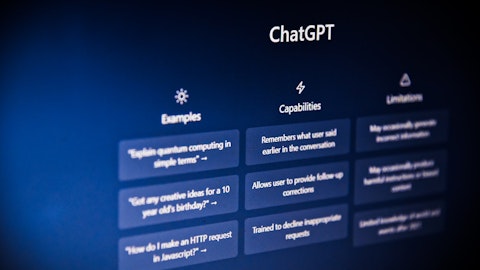In this article, we will look at the 20 jobs that artificial intelligence can’t replace. We have also discussed the potential impact of artificial intelligence on jobs. If you want to skip our detailed analysis, head straight to the 5 Jobs that Artificial Intelligence Can’t Replace.
How Far Has AI Come?
We all understand and believe in the game-changing nature of artificial intelligence that has permeated every aspect of our personal and professional lives. To quantify this understanding, PwC’s Global Artificial Intelligence Study has highlighted the immense potential of AI, with a projected $15.7 trillion contribution to the global economy by 2030. This impact will also be translated into a 26% boost in GDP for local economies. Improvement in labor productivity and product enhancements are set to drive economic gains and stimulate consumer demand with increased personalization.
China and North America are expected to lead with a contribution of $10.7 trillion, nearly 70% of the global impact. With this overwhelming potential, it was inevitable for artificial intelligence to have a role in the disruption of employment and jobs around the world.
Microsoft Corp (NASDAQ:MSFT)’s recent Work Trend Index report based on interviews with 31,000 individuals across different markets, has highlighted the urgency of acquiring artificial intelligence skills. The report reveals that AI aptitude is critical for staying relevant in the workforce. Notably, 82% of business leaders believe employees must upskill to adapt to the AI age, but 60% of workers currently lack these necessary capabilities.
In terms of the company’s developments in AI, Microsoft Corp (NASDAQ:MSFT)’s new AI assistant, Microsoft 365 Copilot, is set to become available to users starting on November 1st. This assistant will summarize meetings in Microsoft Teams for those who choose not to attend and create documents and presentations. It uses technology similar to ChatGPT, which Microsoft Corp (NASDAQ:MSFT) invested in through OpenAI. Copilot costs $30 per month and operates online. While it’s expected to improve productivity, some critics express concerns about potential job disruptions and over-reliance on AI tools. To read more about AI disruption, check our article about the industries being revolutionized by AI and automation technologies.
On the other hand, Alphabet Inc (NASDAQ:GOOG)’s Search Generative Experience (SGE) allows users to generate images and written drafts from text prompts. This development will transform content creation by offering new tools for generating visual and written content. While Alphabet Inc (NASDAQ:GOOG) is taking responsible steps to ensure its tools adhere to policies and guidelines, these AI-driven features can potentially disrupt and change creative and content-related professions.
The disruption of AI is not just limited to jobs. In fact, Alphabet Inc (NASDAQ:GOOG)’s AI is optimizing traffic lights in multiple cities, reducing wait times and emissions. Preliminary results indicate that Alphabet Inc (NASDAQ:GOOG)’s AI has reduced stops by up to 30% and emissions by 10% for 30 million vehicles monthly. This AI development addresses a long-standing issue and makes urban life more sustainable.
Future of the Ultimate Transition to Artificial Intelligence
Recent research reveals that Alphabet Inc (NASDAQ:GOOG)’s AI development may soon consume an alarming amount of electricity, potentially rivaling the energy consumption of entire countries like Argentina, the Netherlands, or Sweden by 2027. The research estimates that if Alphabet Inc (NASDAQ:GOOG) transitioned its entire search business to AI, it could use as much electricity as Ireland, reaching 29.3 terawatt-hours annually. However, this scenario assumes full-scale AI adoption using current hardware and software, which is faced by challenges like a limited supply of powerful GPUs.
How Many Jobs will AI Replace By 2030?
While the exact number of jobs AI will replace by 2030 may not be known but there are projections about the impact it will create. According to a recent McKinsey Global Institute study, nearly 12 million American workers may have to transition to new occupations by 2030, owing to the proliferation of AI with an aging population and the expansion of e-commerce.
The study identifies that ai technologies could automate up to 30% of work hours in the US by 2030 and will affect roles in office support, customer service, and food services. It is also worth noting that positions in customer service and data entry are among the jobs already replaced by AI. Moreover, with the advent of self-checkouts, jobs in retail stores as cashiers have also been largely reduced. To read more about jobs AI will replace in the future, check our article Jobs That Will Disappear in the Future Due to AI.
AI has evolved in several ways in recent years, with the industry now valued at over $100 billion. Heavyweights like Microsoft Corp (NASDAQ:MSFT), Alphabet Inc (NASDAQ:GOOG), and OpenAI are in fierce competition, leading to the rapid development of sophisticated large language models. These models can outperform humans in different tasks, from strategy games to diagnosing cancers and composing music.
However, they have not reached Artificial General Intelligence (AGI), the point where AI possesses human-like cognitive abilities. AGI is still a goal as AI has limitations in creativity and emotional awareness. It is due to this very limitation that we have several jobs that artificial intelligence can not replace.

A contractor working on home repairs, perfecting the details of a homeowner’s dream. Editorial photo for a financial news article. 8k. –ar 16:9
Methodology
To list jobs that artificial intelligence can’t replace, we identified 3 common qualities that can make jobs resistant to AI. Firstly, jobs that involve complex and nuanced human interactions, like therapy and counseling, are far from being replaced by AI. Secondly, jobs that rely on creativity, innovation, and artistic expression, like artists, fashion designers, and chefs, are challenging for AI to replicate as they involve original thinking and personal expression.
Lastly, jobs that demand specialized physical skills, dexterity, and expertise, such as surgeons, are generally less susceptible to AI replacement as they require precision and real-time decision-making with adaptability.
To rank these jobs in order, we have scored these jobs out of a total score of 60 based on the representation of these three features on the basis of consensus from Reddit threads. A higher score indicates a lesser likelihood for the job being replaced by AI. The list is presented in ascending order.
20. Event Planners
IM Score: 20
Event planners require human creativity and interpersonal skills to meet unique client needs and handle unforeseen circumstances. AI may assist with logistical tasks but can’t replicate (even if it simulates) the emotional intelligence, intuition, and personal touch necessary for successful event planning.
19. Teachers
IM Score: 22
While AI can provide information and assist in education or training, human teachers offer emotional support, adaptability to individual learning styles, and valuable mentorship. Teachers, especially vocational training teachers, foster creativity and precision, which AI cannot offer. It is one of the jobs least likely to be replaced by AI.
18. Plumbers
IM Score: 24
Plumbers deal with different and unstandardized plumbing systems, requiring problem-solving and adaptability. They must assess unique situations, account for local regulations, and consider the nuances of individual homes. AI lacks the human judgment necessary for plumbing tasks.
17. Electricians
IM Score: 26
AI can’t fully replace electricians because their job requires adapting to complex and unpredictable electrical systems, troubleshooting issues, and ensuring safety. Electricians also need to interact with clients, making interpersonal skills and judgment vital areas where AI struggles.
16. Welder and Moulders
IM Score: 28
These professionals work on different projects with varying materials, thicknesses, and shapes, demanding precise control and expertise. They must make real-time adjustments based on visual and tactile feedback, which AI currently struggles to replicate accurately. Welding and molding also require creativity and innovation in problem-solving for complex, non-standard projects. It is worth mentioning that underwater welders have one of the most dangerous jobs in the world.
15. Agricultural Equipment Operators
IM Score: 30
Agriculture often involves intricate decision-making based on weather conditions, soil quality, and crop maturity, requiring human judgment. Moreover, agriculture often involves working in unstructured, dynamic environments where AI rarely performs reliably. Reinforcement learning is one technique used to train AI models on such tasks and the technique is rife with challenges, namely, getting the model to learn optimal behavior.
14. Clergy and Religious Leaders
IM Score: 34
Artificial intelligence lacks the human qualities of “spirituality” and moral judgment that are essential for clergy and religious leaders. These roles involve personal and emotional connections, guiding individuals through faith and life’s complexities. It is one of the jobs that artificial intelligence can’t replace.
13. Nurses
IM Score: 35
Nurses offer emotional support, administer medication for patients, and make swift, ethical decisions. Since human touch and intuition are vital in nursing, AI can’t fully replicate these capabilities. Besides, when one is sick, the warmth of human support becomes essential. Thus, nursing is one of the jobs AI will probably never replace.
12. Personal Shoppers and Stylists
IM Score: 39
Personal shoppers and stylists involve intricate human understanding of fashion trends and personal preferences. AI may assist with suggestions but can’t grasp unique individual styles, emotions, and cultural nuances. It is one of the jobs AI can’t replace, not even chatGPT.
11. Chefs and Culinary Experts
IM Score: 40
Artificial intelligence can never replace culinary experts owing to the nuanced artistry, innovation, and sensory experiences of these professionals, which AI can not achieve. It can assist in recipe generation and optimization but can’t match their holistic culinary expertise.
10. Fashion Designer
IM Score: 42
Artificial intelligence in fashion design lacks the intuition and cultural awareness that human designers possess. It can analyze data and generate designs but can’t add the artistic flair and trend-setting oomph that make fashion designers uniquely creative and adaptable to ever-changing styles and tastes.
9. Emergency Responders
IM Score: 44
AI cannot replace emergency responders like firefighters because their roles demand quick physical responses to rapidly changing, life-threatening situations. Firefighters require complex decision-making and physical strength, mostly under unpredictable circumstances. It is one of the jobs that artificial intelligence can’t replace.
8. Musicians
IM Score: 46
The job of artists like musicians is unlikely to be fully replaced by AI because creativity, emotion, and the ability to convey relatable human experiences are integral to art. For example, AI can compose music, but it can’t infuse it with the personal experiences and emotions that make it truly meaningful.
7. Social Workers
IM Score: 47
AI can’t fully replace social workers due to their role’s deeply human and emotionally sensitive aspects. Social work entails understanding and addressing complex, personal, and often traumatic situations. It is one of the jobs that won’t be automated by AI.
6. Carpenters
IM Score: 48
Carpenters create custom woodwork and structures, demanding creativity, craftsmanship, and adaptability. It is one of the jobs AI can’t replace anytime soon.
Click here to see the 5 Jobs that Artificial Intelligence Can’t Replace.
Suggested Articles:
- 25 Highest-Paying Jobs for 18-year-olds
- 20 Highest-Paying Part-Time Jobs For College Students
- 30 High-Paying Remote Jobs Without a Degree or Experience
Disclosure: None. 20 Jobs that Artificial Intelligence Can’t Replace is originally published on Insider Monkey.





